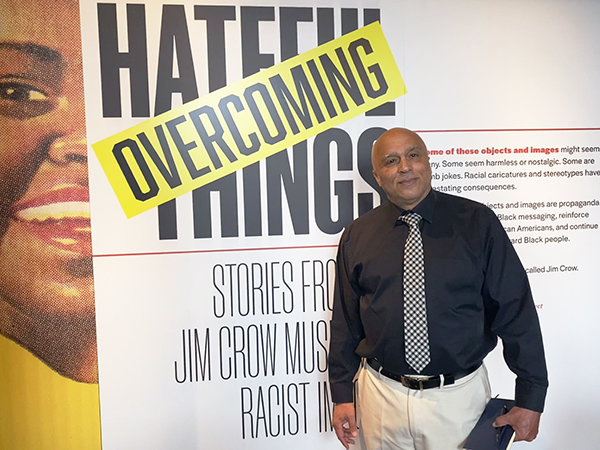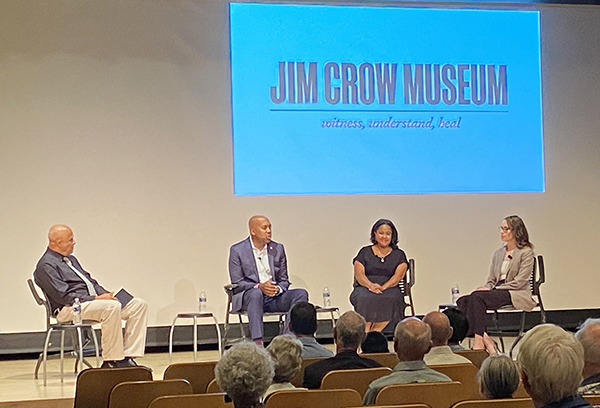
Vice President for Diversity, Inclusion and Strategic Initiatives David Pilgrim led
a panel discussion (Sunday, Aug. 13) at the Grand Rapids Public Museum in conjunction
with the traveling exhibit “Overcoming Hateful Things: Stories from the Jim Crow Museum
of Racist Imagery,” which runs through Sept. 3.
GRAND RAPIDS – Our nation can’t fully heal from the damage of the Jim Crow era without first learning about, and remembering, the hurtful experiences of the past, panelists said at a discussion involving Ferris State University and community leaders.
The discussion at the Grand Rapids Public Museum was held in conjunction with the traveling exhibit “Overcoming Hateful Things: Stories from the Jim Crow Museum of Racist Imagery,” which runs through Sept. 3.
The panel, which included Ferris State President Bill Pink and Vice President David Pilgrim, discussed the mission, vision and ongoing efforts of the university’s Jim Crow Museum of Racist Imagery and the value of ongoing dialogue centered on race, race relations and racism.
“We’re not saying America is not better today. But if you look closely, you’ll see some of the residue of the Jim Crow era in some behaviors and objects,” said Pilgrim, vice president for Diversity, Equity and Strategic Initiatives and founder and director of the university’s Jim Crow Museum.

Panelists for the discussion at the Grand Rapids Public Museum were Ferris State Vice
President David Pilgrim, President Bill Pink, Priority Health Vice President of Population
Health and Health Equity Shannon Wilson and Cyndi Tiedt, collections manager of the
Jim Crow Museum.
Pilgrim said there is racial stress in Grand Rapids and other cities and noted that progress can come when people have conversations. The museum on the Big Rapids campus and the traveling exhibit can play a role in instigating those discussions, he said.
He said Grand Rapids has a growing number of people working in diversity, equity and inclusion posts, and recognizes leaders for their work in advancing civil rights.
“Yet, there are people who are reluctant to have a conversation about race because they are worried about being called a bigot, or perhaps have their bigotry exposed,” he said.
“Overcoming Hateful Things” includes 151 objects, 21 exhibit crates, 17 exhibits and eight multimedia interactives.
The 3,000-square-foot exhibit includes artifacts that serve as reminders of America’s past and an educational tool noting generations of pushback by African Americans through activism and achievement.
“Remembrance is an early step in healing,” said panelist Cyndi Tiedt, collections manager of the Jim Crow Museum. “In order to get healing, you have to remember.”
Pink is Ferris State’s 19th president and the first African American to lead the university. He said he thinks about the experiences of his parents, who hoped problems would be closer to being resolved in his lifetime. He said people must remember the work is a journey with stops and starts. But he said people can’t be discouraged by the enormity of the problem, leading to paralysis.
“It took a century to get where we are, and people who think these problems can be solved overnight are unrealistic,” said panelist Shannon Wilson, vice president of Population Health and Health Equity at Priority Health. “There is no quick fix. We have to look at ‘where is the bleeding,’ and ‘how can we stop the bleeding’ so we can get to the root cause.”
The traveling exhibit was presented in partnership with the Grand Rapids Public Museum. The Wege Foundation awarded a $500,000 grant in June supporting it and assisting in efforts to have it displayed across the nation and worldwide in the months and years to come.

